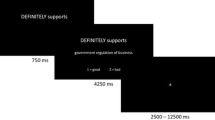Abstract
Political scientists and psychologists have noted that, on average, conservatives show more structured and persistent cognitive styles, whereas liberals are more responsive to informational complexity, ambiguity and novelty. We tested the hypothesis that these profiles relate to differences in general neurocognitive functioning using event-related potentials, and found that greater liberalism was associated with stronger conflict-related anterior cingulate activity, suggesting greater neurocognitive sensitivity to cues for altering a habitual response pattern.

Similar content being viewed by others
References
Jost, J.T., Glaser, J., Kruglanski, A.W. & Sulloway, F.J. Psychol. Bull. 129, 339–375 (2003).
Alford, J.R., Funk, C.L. & Hibbing, J.R. Am. Polit. Sci. Rev. 99, 153–167 (2005).
Block, J. & Block, J.H. J. Res. Pers. 40, 734–749 (2006).
Miller, E.K. & Cohen, J.D. Annu. Rev. Neurosci. 24, 167–202 (2001).
Botvinick, M.M., Braver, T.S., Barch, D.M., Carter, C.S. & Cohen, J.D. Psychol. Rev. 108, 624–652 (2001).
Kiehl, K.A., Liddle, P.F. & Hopfinger, J.B. Psychophysiology 37, 216–223 (2000).
Nieuwenhuis, S., Yeung, N., Van Den Wildenberg, W. & Ridderinkhof, K.R. Cogn. Affect. Behav. Neurosci. 3, 17–26 (2003).
Jost, J.T. Am. Psychol. 61, 651–670 (2006).
Gehring, W.J., Goss, B., Coles, M.G.H., Meyer, D.E. & Donchin, E. Psychol. Sci. 4, 385–390 (1993).
Dehaene, S., Posner, M.I. & Tucker, D.M. Psychol. Sci. 5, 303–305 (1994).
Yeung, N., Botvinic, M.M. & Cohen, J.D. Psychol. Rev. 111, 931–959 (2004).
Adorno, T.W., Frankel-Brunswick, E., Levinson, D.J. & Sanford, R.N. The Authoritarian Personality (Harper and Row, New York, 1950).
Kaplan, J.T., Freedman, J. & Iacoboni, M. Neuropsychologia 45, 55–64 (2007).
Knutson, K.M., Wood, J.N., Spampinato, M.V. & Grafman, J. Soc. Neurosci. 1, 25–40 (2006).
Acknowledgements
We thank A. Crampton and B. Lehman for assisting with data collection, and S. Taylor for laboratory support.
Author information
Authors and Affiliations
Contributions
D.A. designed and conducted the experiment, analyzed the data, and wrote the manuscript. J.J. contributed to theorizing and co-wrote the manuscript. S.M. assisted in experiment design, data collection, and writing the manuscript. C.Y. provided laboratory support and supervision, and assisted in writing the manuscript.
Corresponding author
Supplementary information
Supplementary Text and Figures
Supplementary Figure 1 and Methods (PDF 124 kb)
Rights and permissions
About this article
Cite this article
Amodio, D., Jost, J., Master, S. et al. Neurocognitive correlates of liberalism and conservatism. Nat Neurosci 10, 1246–1247 (2007). https://doi.org/10.1038/nn1979
Received:
Accepted:
Published:
Issue Date:
DOI: https://doi.org/10.1038/nn1979
- Springer Nature America, Inc.
This article is cited by
-
Expectations about system justification predict the ideological gap in attitudes towards immigrants
Scientific Reports (2023)
-
Moral foundations elicit shared and dissociable cortical activation modulated by political ideology
Nature Human Behaviour (2023)
-
Political segmentation based on pictorial preferences on social media
Quality & Quantity (2023)
-
Who Cares More About the Environment, Those with an Intrinsic, an Extrinsic, a Quest, or an Atheistic Religious Orientation?: Investigating the Effect of Religious Ad Appeals on Attitudes Toward the Environment
Journal of Business Ethics (2023)
-
The impact of social and cultural atmosphere on ethnic minority groups’ online entrepreneurship intention: A multi-group analysis on the gender gap
Journal of International Entrepreneurship (2023)





